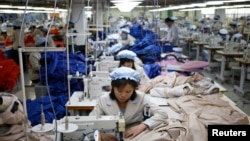A representative of South Korean firms with factories at the Kaesong Industrial Complex has called for a prompt resolution to the ongoing wage dispute between North and South Korea.
Yoo Chang-keun, vice chairman of South Korea’s Kaesong Industrial Complex Business Association, told VOA Monday the companies are concerned about possible economic damage from the wage dispute, which has been dragging on for months.
“Because the wage dispute has been going on for months now, it’s difficult to predict the future," Yoo said. "We wish for both sides to meet again soon to resolve the issue."
Last week, officials from the two sides held the first government-to-government talks this year to resolve the dispute over wage increases for North Korean workers at the complex, but failed to reach a deal.
According to South Korean officials who participated in the talks, the North stuck to its previous position that it should make decisions about the wage increases for its workers. The South insists such decisions should be made through mutual agreement, citing an inter-Korean agreement.
A South Korean official, who asked to remain anonymous, told VOA the South has shown flexibility by offering projects to improve the complex’s infrastructure, but the North has been adamant on its position.
The official added the North was also reluctant to discuss the South’s proposal to streamline procedures for passage to and from the facility, communications, and customs at the inter-Korean border.
Another official said the North blamed the South’s sanctions for its reluctance to the proposal.
In 2010, Seoul took the so-called May 24 measure against Pyongyang, a retaliatory response to the fatal sinking of one of its navy ships. An international investigation team, led by Seoul, concluded a torpedo attack by North Korea was responsible for the sinking, but Pyongyang denied involvement.
The two sides have been at odds over the Kaesong wage increase since late last year, when the North unilaterally revised labor regulations recognized by both sides to allow wage increases for its workers.
Analysts in Seoul say it is unlikely for the North to resume talks with the South in the near future. On Sunday, North Korea rejected Seoul's offer for further talks.
Jee Abbey Lee contributed to this report, which was produced in collaboration with the VOA Korean service.




